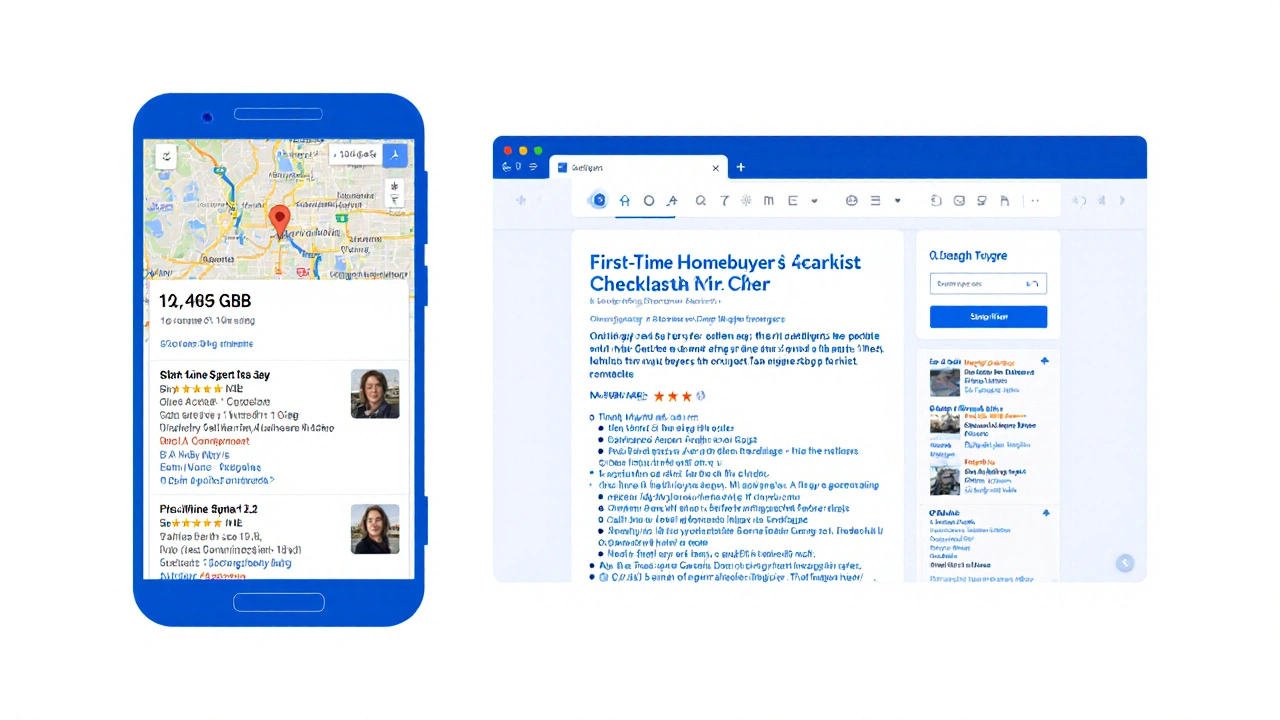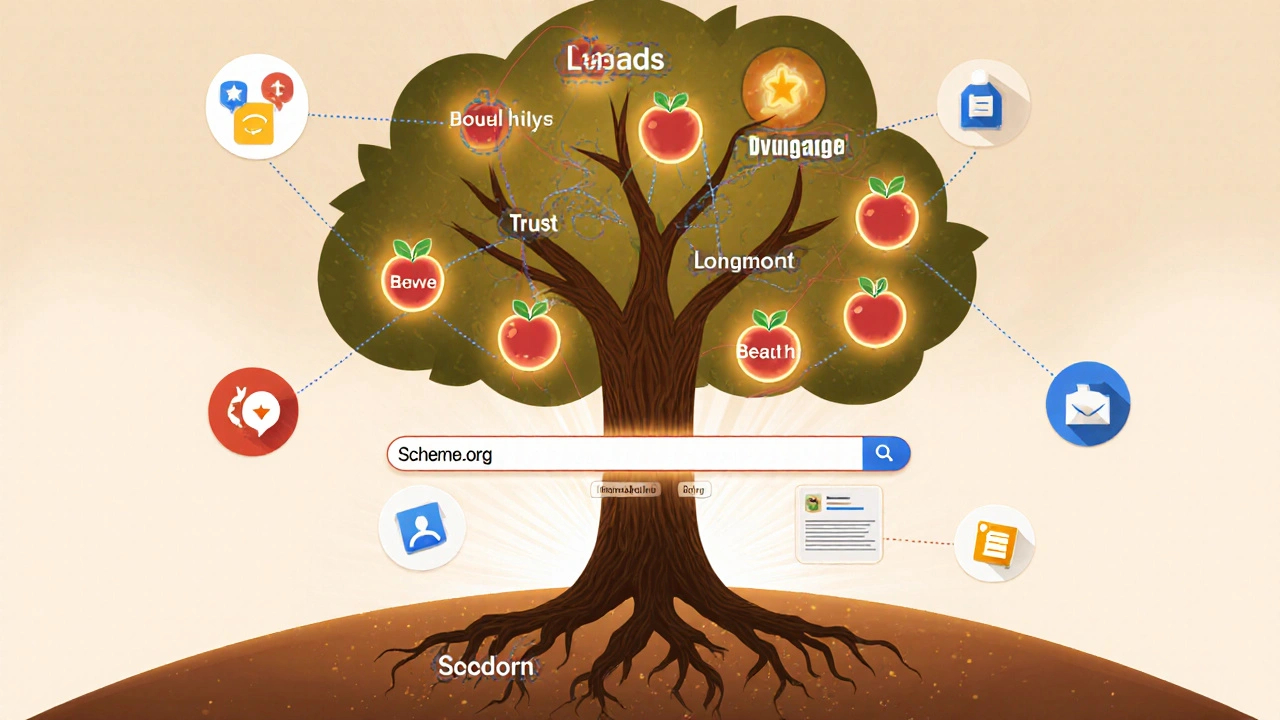Most real estate agents spend hours showing homes, networking at open houses, and cold-calling leads. But the best leads? They’re already online. They’re typing "homes for sale in Boulder" or "best realtor near me" right now. If your website doesn’t show up when they search, you’re invisible. Real estate SEO isn’t optional anymore-it’s the difference between paying for ads and getting free, qualified traffic every single day.
Why Real Estate SEO Works Better Than Ads
Google Ads can get you quick visibility, but they cost money. Every click costs $5 to $20 depending on your market. And as soon as you stop paying, your listings disappear. Real estate SEO is different. Once you rank for "3 bedroom houses in Lafayette" or "luxury condos downtown," you keep showing up-even when you’re sleeping. A study by BrightLocal found that 92% of homebuyers start their search online. If you’re not on page one, you’re losing 9 out of 10 potential clients before they even call.
Real estate SEO builds trust. People don’t click on ads as often as they used to. They scroll past them. But when they see your name, your photos, your reviews, and your listings all on the same page in Google’s organic results? That’s credibility. That’s authority. That’s how you become the go-to agent in your area.
Start with Your Google Business Profile
If you’re not claiming your Google Business Profile (GBP), you’re leaving money on the table. This isn’t just about being listed-it’s about dominating the local map pack. When someone searches "real estate agent near me," the top three results are almost always GBP listings. If yours isn’t there, you’re not even in the game.
Optimize your profile with:
- Exact business name: "Nadia Greymont Real Estate - Boulder, CO" (not "Nadia’s Homes" or "Realtor Nadia")
- Accurate address and service areas: Include every neighborhood you serve
- High-quality photos: Front of your office, you smiling with a client, local landmarks
- Real reviews: Ask happy clients to leave feedback. Respond to every one-good or bad
- Posts every week: Share new listings, open house events, market updates
Google uses this data to decide who’s relevant, active, and trustworthy. A profile with 25 reviews and weekly posts beats one with 100 reviews and no updates. Consistency matters more than volume.
Keyword Research: What Are Buyers Actually Searching For?
You can’t rank for "real estate"-that’s too broad. You need to target what people say when they’re ready to act. Real estate SEO isn’t about fancy terms. It’s about matching real questions.
Use free tools like Google Trends or AnswerThePublic to find these phrases:
- "How much down payment do I need in Colorado?"
- "Are home prices dropping in Boulder?"
- "Best schools near downtown Denver"
- "Rent to own homes in Longmont"
These are long-tail keywords-specific, low-competition, and high-intent. People asking these questions are ready to move. They’re not just browsing. They’re looking for someone to help them. Put these phrases in your page titles, headers, and blog posts. Don’t stuff them. Write naturally. Answer the question clearly.
One agent in Fort Collins started ranking for "pet-friendly apartments in Fort Collins" after writing a 1,200-word guide. Within three months, he got 47 leads from that one page. That’s the power of solving a real problem.

Website Structure That Converts
Your website isn’t a brochure. It’s a lead machine. If someone lands on your homepage and can’t find what they need in 5 seconds, they leave. Real estate SEO requires clean, simple structure.
Here’s what works:
- Homepage: Clear headline like "Helping Families Find Homes in Boulder Since 2018" + CTA button: "View Current Listings"
- Neighborhood Pages: Create one page per neighborhood (e.g., "Boulder Hills Homes for Sale"). Include median prices, school ratings, walkability scores, and local events.
- Property Listings: Use structured data (Schema.org) so Google shows price, beds, baths, and photos directly in search results.
- Blog: Answer questions like "Is now a good time to buy in Colorado?" or "How to prep your home for sale in winter?"
- Contact Page: Make it easy. No forms with 10 fields. Just name, email, phone, and "When can we talk?"
Don’t forget mobile. Over 60% of home searches happen on phones. If your site loads slow or the buttons are too small, you’re losing leads. Test your site speed with Google PageSpeed Insights. Aim for a score above 80.
Content That Builds Authority
Google doesn’t reward websites that just list homes. It rewards websites that help people make decisions. That’s where content comes in.
Write guides that answer real questions:
- "A First-Time Homebuyer’s Checklist for Colorado"
- "How to Negotiate a Home Offer in a Seller’s Market"
- "The Truth About Home Inspections in Denver"
- "Why Buyers Are Choosing Townhomes Over Single-Family Homes in 2025"
Each piece should be 1,000+ words, include real data (e.g., "Median home price in Boulder: $895,000 as of Q3 2025"), and link to your listings. Don’t write for Google. Write for the person scrolling at 11 p.m. after a long day at work. Be helpful. Be honest. Be human.
One agent in Denver started a monthly market report emailed to 500 subscribers. He didn’t sell directly from the email. He just gave facts-inventory levels, days on market, interest rate trends. Within six months, 72% of his new clients said they found him through that newsletter. Content builds relationships. Relationships close deals.
Backlinks: Get Noticed by Google
Backlinks are votes of confidence from other websites. Google sees them as proof you’re trustworthy. But you don’t need links from big news sites. You need local ones.
Here’s how to earn them:
- Get listed on local chamber of commerce websites
- Write guest posts for local blogs about home improvement or community events
- Partner with a mortgage broker and swap links
- Get featured in local news stories-offer to be a source on housing trends
- Ask past clients to link to your site from their personal blogs or Facebook groups
A real estate team in Colorado Springs got 37 backlinks from local schools, libraries, and nonprofit sites by sponsoring community events and asking for links. Within a year, their organic traffic doubled.

Track What Matters
You can’t improve what you don’t measure. Set up Google Analytics and Google Search Console. Look for:
- Which pages get the most traffic?
- Which keywords are bringing in clicks?
- What’s your bounce rate on neighborhood pages?
- How many people fill out your contact form?
Don’t obsess over rankings. Focus on leads. If you’re getting 20 qualified leads a month from SEO, you’re winning. If your website gets 10,000 visits but no calls? You’ve got a problem.
Use UTM parameters on your links so you know which blog posts or social posts are driving traffic. Test one thing at a time. Change your headline. Try a new CTA. Track the results. SEO is a series of small wins.
Common Mistakes to Avoid
Most agents fail at real estate SEO because they make these simple errors:
- Using the same description for every listing-Google sees this as spam
- Buying fake reviews or using keyword-stuffed content
- Ignoring mobile optimization
- Not updating listings after they sell
- Thinking SEO is a one-time setup
SEO isn’t a project. It’s a habit. Update your blog weekly. Respond to reviews. Add new neighborhoods. Fix broken links. Keep your profile fresh. Google rewards consistency.
Real Estate SEO Is a Long Game
You won’t rank on page one for "homes for sale in Denver" in 30 days. It takes 4 to 6 months to see real traction. But once you do, you’ll have a steady stream of leads without paying for ads. The agents who win in 2025 aren’t the ones with the flashiest websites. They’re the ones who show up, every day, with helpful content, accurate data, and real connections.
Start today. Claim your Google Business Profile. Write one neighborhood guide. Fix your website’s mobile load time. That’s it. You don’t need a big budget. You just need to be useful, consistent, and visible.
How long does it take to see results from real estate SEO?
Most agents start seeing more traffic and leads between 4 and 6 months after starting SEO. It depends on your market, competition, and how consistent you are. If you’re in a smaller town with less competition, you might see results in 2 to 3 months. In big cities like Denver or Boulder, it usually takes longer because there are more agents fighting for the same keywords.
Do I need to hire an SEO agency for real estate?
Not necessarily. Many agents handle their own SEO successfully by focusing on Google Business Profile, local keywords, and consistent content. If you’re comfortable writing blog posts, updating listings, and responding to reviews, you can do it yourself. But if you’re overwhelmed or don’t have time, a specialized real estate SEO agency can help speed things up. Look for agencies that focus only on real estate-not general SEO.
What’s the most important factor in real estate SEO?
Google Business Profile. It’s the #1 ranking factor for local searches. Even if your website is perfect, if your GBP is incomplete, outdated, or unclaimed, you won’t show up in the local map pack. That’s where most buyers start their search. Fix your profile first, then work on the rest.
Should I use the same photos for every listing?
No. Google penalizes duplicate content, including images. Use original photos for every property. Even if you’re using a professional photographer, make sure each listing has unique shots. Generic stock photos or reused images hurt your credibility and reduce your chances of ranking. Buyers want to see the actual home-not someone else’s.
Is blogging still important for real estate SEO in 2025?
Yes, but not for the reason you think. Blogging isn’t about keyword stuffing. It’s about becoming a trusted local expert. People search for answers before they call an agent. If you write clear, helpful guides on topics like "How to get pre-approved in Colorado" or "What to expect during closing in 2025," you’ll attract people who are ready to buy. Blogging builds trust-and trust closes deals.

13 Responses
OMG this is so true! I just started doing SEO for my real estate page and already got 3 leads in 2 weeks. No ads, no spending. Just good ol’ Google. 🤯
gud post but u forgot to mention gmb posts need to be done daily not weekly. also fix ur spelling its 'realtor' not 'realtor' lol
You’re absolutely right - SEO isn’t magic, it’s muscle. I started with just one neighborhood guide on ‘homes near Denver light rail’ and now I get 15-20 calls a month from people who found me organically. No cold calls. No ads. Just people who needed help and found me because I answered their question. Keep going. It works.
This is gold 💯 I’ve been doing GBP for 6 months and my calls jumped 300%! 🙌 Also, responding to reviews - even the bad ones - makes people trust you more. I reply to every single one with a heart emoji ❤️
Just claim your GBP and write one blog. That’s it. No need to overthink. I did that and got 12 leads last month. Simple.
I used to think SEO was for tech people. Then I wrote a post on ‘how to buy a house with bad credit in Colorado’ and got 8 calls in a week. People just want help. Be that person.
SEO? Cute. Real agents use LinkedIn and Instagram reels. This is 2020 thinking. Also, ‘long-tail keywords’? Who says that anymore?
Hey Rohit - I get where you’re coming from, but I’ve seen agents who ditched SEO and now they’re stuck paying $18 per click just to get a single call. SEO isn’t dead, it’s just quiet. And quiet wins long-term. If you’re doing reels, great - but pair it with a blog that answers real questions. That combo? Unstoppable.
Incorrect usage of ‘its’ and ‘it’s’ throughout. Also, ‘neighborhood pages’ should be capitalized if referring to proper nouns. And ‘GBP’ is not universally known - spell it out first. This article reads like a draft.
Start small. Claim your profile. Write one guide. Fix your mobile speed. Do that for 30 days and come back. No fancy tools needed. Just consistency. I did this last year and now I don’t even remember the last time I paid for a lead
This article is riddled with grammatical errors, improper punctuation, and a casual tone utterly inappropriate for professional real estate marketing. Furthermore, the use of colloquialisms such as ‘you’re invisible’ and ‘you’re winning’ is unprofessional and undermines credibility. A serious industry demands serious communication.
Wait… are you sure Google isn’t tracking your GBP to sell your data to big real estate corporations? I heard they’re using AI to predict when you’re about to close a deal and then spam you with mortgage offers. Also, why does every blog say ‘write for the person scrolling at 11 p.m.’? That’s not real. That’s corporate BS.
While the general sentiment of this piece is commendable, the lack of rigorous citation for the BrightLocal statistic is a glaring omission. Moreover, the assertion that ‘consistency matters more than volume’ is empirically unsupported without reference to longitudinal studies on local SEO performance. Additionally, the use of the term ‘lead machine’ is dehumanizing and reflects a transactional mindset antithetical to the ethical practice of real estate. One must not reduce human beings seeking shelter to mere conversion metrics. Furthermore, the suggestion to ‘fix your profile first’ is logically flawed - one must first establish domain authority before optimizing local signals, lest one fall prey to the Google Local Pack’s algorithmic biases which disproportionately favor established firms. In sum, while well-intentioned, this advice is dangerously oversimplified and risks leading practitioners into the trap of performative SEO rather than genuine value creation.